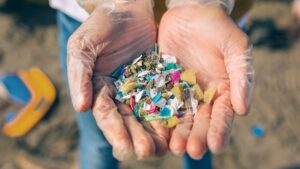Plastic degradation in the ocean contributes to its acidification
Experiments have shown that plastic oceanic trash exposed to sunlight increases the acidity of surrounding waters.
In extremely polluted waters, the acidity dropped by 0.5 pH – which is in line with the worst anthropogenic projections by the end of the century.
Story Preview:
A new study led by the Institut de Ciències del Mar (ICM-CSIC) in Barcelona has revealed that plastic degradation contributes to ocean acidification via the release of dissolved organic carbon compounds from both the plastic itself and its additives.
“Thanks to this study we have been able to prove that in highly plastic-polluted ocean surface areas, plastic degradation will lead to a drop of up to 0.5 pH units, which is comparable to the pH drop estimated in the worst anthropogenic emissions scenarios for the end of the 21st century,” points out Cristina Romera-Castillo, ICM-CSIC researcher and first author of the study, which has been published this week in the journal Science of the Total Environment.
Acidification and plastic pollution are two of the major problems facing the ocean today. Since the industrial revolution, the increase in ocean acidity has made it more difficult for some calcifying organisms, such as corals, to maintain their skeletons. Every year up to 13 million tons of plastic reach the sea.
Preview text: Institut de Ciències del Mar (ICM-CSIC), Phys.org, September 20, 2022
Read the full and original story at Phys.org – based on research published in Science of the Total Environment.



